By Danish Reyaz | Maeeshat | Guwahati
Mahbubul Hoque, during his student years at Aligarh Muslim University, was a reflective person. When he used to get time out of his study, he would often visit the tomb of Sir Sayed Ahmed and sit there in quietude, showing respect to the great man who founded the world-famous university.
Little did he realize that one day he would himself be known as Sir Syed of North East for his ground-breaking work in promoting modern education in the region that mainstream India often overlooks and neglects.
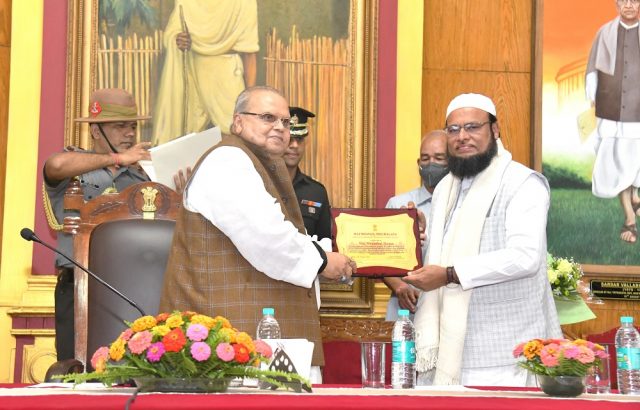
Meghalaya Governor Satya Pal Malik presenting the Governor’s Award for Excellence in Public Service to Mahbubul Hoque
Mahbubul Hoque is an enterprising man who broke free from his poverty-stricken childhood and went on to secure admission to Aligarh Muslim University (AMU) on merit. But then, after completing his Masters, he said no to lucrative corporate job offers and returned to his native place to work for his people.
Twenty years later, his achievements are downright incredible. He founded the University of Science and Technology Meghalaya (USTM), the first private university in the North East region and by far the best of all his ventures.
It is an “A” Grade university accredited by National Assessment and Accreditation Council (NAAC), offering the best education in scores of professional courses to thousands of students from eight neighboring states.
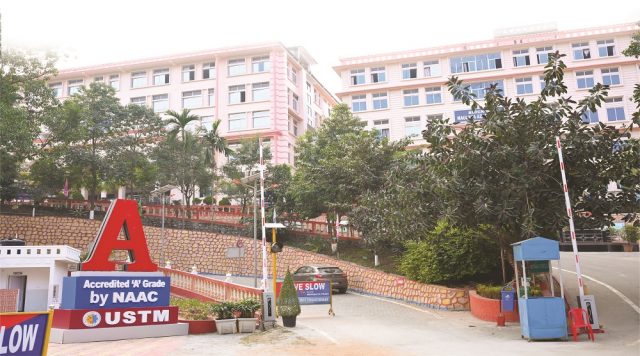
Besides USTM, Mahbubul Hoque, the Founder Chairman of the Educational Research and Development Foundation (ERDF), has established nine other educational institutions, including three state-of-the-art colleges and two CBSE-affiliated schools.
The incredible story of his successful journey as an educational entrepreneur (Edupreneur) we are about to read is a testament to how a human can triumph over all odds with an unswerving spirit of self-belief and hard work to bring about a meaningful change in society.

Former President of India (Late) Dr APJ Abdul Kalam handing over his books as gift to Mahbubul Hoque
A Polite and Cultured Man
Mr. Hoque is hugely successful and reputed, yet he is a simple and down-to-earth man. He is also quite religious. He sports an Islamic beard and wears a white kurta pajama pairing it with a shadri and a skullcap.
One might mistake him for being a Maulana, but speak to him, and he will enlighten you with his vision and knowledge as a successful educational entrepreneur while switching back and forth to fluent English during the conversation.
He says, “There is no point in living a luxurious life and showing off. Life and wealth are from the Almighty for doing good deeds and to serve the society for which we are answerable on the Day of Judgement.”
A cultured man, Mr. Hoque knows how to treat you well without giving you an air of him being highly successful. He is very polite and sincere and as much agog when it comes to talking about everything related to education and institutions.
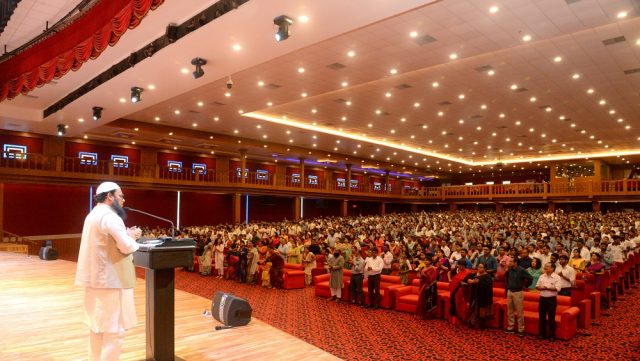
Central Auditorium of University of Science and Technology Meghalaya
“Educational development of my region remains uppermost in my mind. You can observe that while I talk,” Mr. Hoque says. We couldn’t differ, seeing how his life is a constant endeavour to bring about an educational revolution in the far-flung region of India.
Early Life and Education
Mahbubul Hoque was born on December 1, 1973, in a remote and nondescript Poorbogul village of Patharkandi in Assam’s Karimganj district. Unfortunate incidents and financial difficulties marred his early life.
When he reached the seventh standard, his father, a Panchayat Secretary, passed away. While he was in 12th standard, his mother left this world. And worst of all, on a fateful day, his elder brother, who used to help support his education, fell victim to a fatal road accident.
“Those were nightmarish times,” Mr. Hoque recalls, “But I never gave up. Initially I sold home-grown vegetables in local market and later also gave tuition to schoolchildren to finance my education.”
Nevertheless, the bright spot in his financially constrained life was that he was a meritorious student. He passed his matriculation from Karimganj and Intermediate (Science) from G.C. College, Silchar with flying colours.
He came to Aligarh Muslim University with stars in his eyes to obtain the best education. He stayed there from 1993 to 2000, studying with all his heart and soul. He did his BSc (Chemistry) with first class and PGDCA & MCA, securing first class second rank.
A promising career in multinational companies was beckoning as plenty of job offers were lined up for him. But he had a different plan for himself. He moved back to Assam with his books and one old computer that he had purchased in Aligarh.

Humble Beginning as Educational Entrepreneur
Back in Assam, Mr. Hoque decided to be an Edupreneur. In those days, Computer Science courses were gaining in demand. Since he had a way with computers in Guwahati, he wanted to start a private IT start-up in partnership. But he received a lukewarm response from the community entrepreneurs.
One of the wealthiest businessmen and community leaders who now owns a political party told him that he wouldn’t make any headway as a computer entrepreneur because his wearing of kurta pajama and a skullcap might not go down well with the students and their parents.
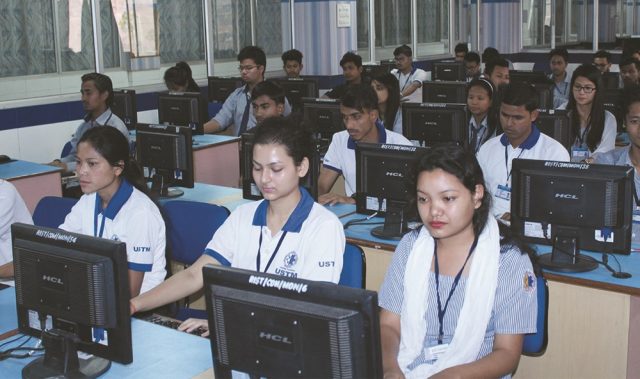
Discouraged and disheartened, Mr. Hoque now decided to go solo on his project. He made a start in 2001 with mere Rs 84 in his pocket, four IGNOU-enrolled students, and his old computer that he had brought along from Aligarh. His institution was a rented room at Ganeshguri area of Guwahati. In his initial days of struggle, he lived in the institution, spending his nights sleeping on the office sofa as he could not afford to rent a house for permanent stay. Once upon a time, the owners of building were also not ready to offer rental house to him. That was just the beginning but after that he did not have to look back.
He started assembling computers and sold 100 of them. With that money, he was now able to set up a 5-computer lab in Guwahati and take the franchisee of Sikkim Manipal University (SMU), a prestigious private university for distance mode education across India.
“Affiliation fee for a Manipal study centre was Rs 2 lakh, which obviously I didn’t have at that time,” Mr. Hoque reminisces, “A gentleman at Manipal, after knowing my Aligarh background and my merit agreed to grant me the affiliation keeping the fee payment pending, which I later cleared in instalments of Rs 25,000 after borrowing from a friend.”
Soon stars started smiling down on gritty and hardworking Mr. Hoque. The study centre that only had 26 students in its first batch swelled to 3500 in 2006, becoming the second largest SMU centre in India.
“We received five consecutive Excellence Awards from the hands of India’s star bowler Anil Kumble, who happened to be the Brand Ambassador of Sikkim Manipal University in those years,” says Mr. Hoque smilingly.
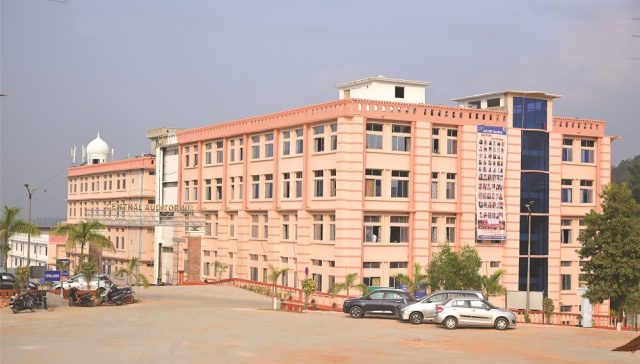
Central IT College
The Manipal study centre run by Mr. Hoque is now famously known as Central IT College. With time, it has added many professional courses to attract students from various streams. Besides Computer Science, the Central IT College has Management, Mass Communication, Arts and Humanities, Biotechnology, and Allied Health Services courses.
It has also been selected as the Nodal Centre for the Eastern region to conduct Biotechnology practical. The centre has 600 odd computers in its lab. It is so much enough that Infosys regularly hires this lab to conduct large-scale exams for central government jobs.
His Vision Broadens: Foundation of ERDF
Mr. Hoque had always wanted to serve the community in a progressive way. So, he was not going to rest with the spectacular success he achieved running the Manipal study centre.
He envisioned building multiple educational institutions to tap into the massive potential of the North Eastern students and thus prevent them from migrating to other parts of the country. Back then, the migrating students were shelling out lakhs of rupees for their education, accommodation, and long-distance travelling.
To realize his dreams, Mr. Hoque established the Education Research and Development Foundation (ERDF) in 2005, under the patronage of which multiple educational institutions, one after another, sprang up at several places in Assam and Meghalaya.
“After I founded ERDF, my dreams took wings. I am now operating at a much bigger and broader scale, helming so many institutions at once. It is challenging but immensely satisfying,” says Mr. Hoque.
Here is a look at the institutions Mr. Hoque has established, espoused by ERDF.
Central Public School, Patharkandi
In a rural area of Patharkandi in the Karimganj district, the Central Public School was established in 2008, the first school by ERDF. The school is CBSE-affiliated and known for providing excellent education to poor and underprivileged students at an affordable price.
Central Public School, Badarpur
Following the success of the Central Public School at Patharkandi, its second branch was opened at Badarpur in the same Karimganj district in 2010.
The CBSE-affiliated school is spread over 3-acre land and is well-equipped with everything a modern school requires. This school’s objective was similar to the first: to serve students from poor backgrounds belonging to remote underdeveloped areas.
Khairun Nessa Begum Women’s College, Badarpur
Two Central Public Schools in the Karimganj district have contributed significantly to the betterment of primary and secondary education in the region. Meanwhile, there was also a need for a college for women from the poor and marginalized section who often don’t get chance to pursue their education to a higher level due to lack of opportunities.
So, intending to write a new chapter in women’s education, Khairun Nessa Begum Women’s College, named after Mr. Hoque’s loving mother, came into existence in 2015 in Badarpur. The college is affiliated with Assam University, Silchar.
No Personal Ambition Despite Success
A man who has built so many institutions and continues doing so has no personal ambitions, but an unbounded desire to see the poor and marginalized doing well educationally. His life is a mission to build institutions and play his part in changing the educational landscape of the North East.
“There is no dearth of talent in the North East. The students here are smart and proficient in English because English is the medium of instruction in the whole region except Tripura and Assam,” says Mr. Hoque.
According to him, the only problem afflicting the region is the lack of institutions for higher education. However, in the last two decades, things have changed. Due to his and others’ tireless efforts, quality institutions have been coming up, and it is not only improving the overall educational scenario in the region but also stemming the migration of students to the rest of India in quest of a good education.
Mr. Hoque’s commitment to his cause can be gauged from the fact that despite running the Manipal study centre quite profitably, he never aspired to a life of wealth and material comfort. Instead, living in a rented house of two rooms and meagre facilities, he was busy thinking about establishing schools and colleges for the benefit of students.
“I used to earn about 8-10 crores annually from the Manipal study centre since it was doing really well. However, instead of spending the money on frivolous things for personal gratification, I used that to buy lands,” Mr. Hoque says.
The practice of buying lands proved to be a visionary move for Mr. Hoque because whenever he decided to found an institution, he already had land for it.
He says, “I didn’t have much of the backing of the wealthiest people. I knew whatever I aspired to do could be achieved if only I put the right step forward. Buying lands in advance was one of the right steps of which I am glad about today.”
Meghalaya Calling: Establishment of RIST
Dreams have their own destiny and can take you to new destinations where they can fructify. The same has happened with Mr. Hoque as he came to Meghalaya from Assam, chasing a dream.
When Manipal study centre was booming, Mr. Hoque was nurturing a dream to have a full-fledged college of his own. But, somehow, it was not materializing in Assam due to technical reasons mostly. It would have taken him long to make his dream come true if he had kept waiting.
Professor Samudra Phookan, a well-known friend of Mr. Hoque, suggested he should explore the possibility of establishing the college in Meghalaya instead. The latter was a neighbouring state not far from Guwahati; moreover, the land was cheaper there. The idea appealed to Mr. Hoque. As luck would have it, the Meghalaya government was more than welcoming in giving NOC and providing necessary cooperation to Mr. Hoque.
In no time, in 2009, the Regional Institute of Science and Technology (RIST) came up in Meghalaya, becoming the first engineering college in the state. RIST sprawls over 130-acre lush green hilly land in Baridua, 9th Mile, popularly known as Techno City in Ri-Bhoi district, Meghalaya.
The scenic beauty of the place adds to the attraction for the students, while its sheltered atmosphere is ideal for more focused study. On the other hand, the developed architecture, modern facilities and amenities, and highly competent teaching staff make RIST one of the best and most sought-after engineering colleges in the North East region.
The college is affiliated with North Eastern Hill University, Shillong, while the courses are AICTE approved. RIST is the largest technical campus in the North East, offering an excellent platform for students to achieve excellence.
Establishing USTM: A Giant Leap
Following the success achieved with the new schools and colleges Mr. Hoque by now had become a well-known figure in the North East. However, he was destined to do something even bigger.
It so happened that once former governor of Meghalaya Shri R.S. Mooshahary, impressed by Mr. Hoque’s excellent capability in running and managing so many institutions, asked him to apply for establishing a university. For Mr. Hoque it was a shot in the arm.
“Although something of this nature was at the back of my mind from the beginning, I had not applied thought to it. But coming it from the governor, I felt encouraged and my belief in my ability increased many times,” says Mr. Hoque smilingly.
Nevertheless, it was a mammoth task which also required huge amount of money and a massive piece of land. There were roadblocks no doubt but Mr. Hoque persevered.
“We used to land hunting relentlessly so that we can buy a mass of land at cheaper rate considering the limited financial resources we had,” says Mr. Hoque.
The hunt came to an end after Mr. Haque could manage to buy a 400-acre land, again a hillock but picturesque landscape amidst exquisite greenery in the Baridua area of 9th Mile in Ri-Bhoi district in Meghalaya. It is the place where the University of Science and Technology Meghalaya, popularly known as USTM, has come along with all its glory.
Mr. Hoque recalls how even the government officials were intrigued when he proposed the land for establishing the university since it was slightly a faraway site from people settlements.
“Although it was a secluded place, I believed it would be excellent for the academic environment. Now the place has developed into a small city, and people from far and wide visit the campus for various reasons,” says Mr. Hoque.
USTM Journey So Far
Spurred by governor Mooshahary’s suggestion, Mr. Hoque submitted the university’s draft to the government in 2007, and swiftly, in 2008, the bill for the proposed university was passed.
However, since setting up a university was the dearest dream of Mr. Hoque he was not in a haste to start it even after getting the nod from the government. Various issues, including financial challenges, were to be taken care of before taking the plunge.
Mr. Hoque took a loan of ten crores from the bank for the construction of buildings and endowment fund. Only after everything seemed all right did USTM begin its journey in 2011.
USTM started with only 6 students in the year 2011 before growing into having more than 6,000 students, 22 departments, and 60 courses. Today it is the largest private university in the North East region in terms of total area, constructed space, and number of students.
Mr. Hoque says, “While the university was coming up, several people helped us in whatever way they could. Some helped us with materials, while some, including contractors, came forward to help us financially.” Recalling one incident he says, “One contractor even sold his wife’s gold to offer us some money.”
He further says the staff and students have also helped the university grow. For example, students even made advance payments whenever there was a financial crunch. At the same time, the staff, on several occasions, agreed on deferred payments. “I have immense gratitude to all of them who have been partners in our beautiful journey,” says Mr. Hoque.
The beautifully laid-out university is divided into several zones and blocks, with various departments, halls, and hostels spread across the sprawling property. Big modern structures, two giant entry gates, wide and clean roads, vibrant gardens, and greenery all around add to the magnificence of the university. One can’t miss getting marvelled at the prodigiously big and state-of-the-art central auditorium with a seating capacity of 3000 persons.
The university premise also houses several colleges a few of the ERDF-backed Institutions are: Professor Qoumrul Hoque School of Education—anNCTE recognized B.Ed. college named after Mr. Hoque’s elder brother, a BCI approved University School of Law and Research, the School of Business Science, approved by AICTE, a PCI approved Pharmacy College—Schoolof Pharmaceutical Sciences, Meghalaya. Another PCI approved college of pharmaceutical science established under ERDF is, Allama TR College of Pharmacy, Badarpur, Assam. A total of 1200 professionals makes up the workforce under the Foundation, offering services in different capacities.
USTM is gaining in reputation every year, and students’ faith in it is only increasing. In terms of not only results but also research, USTM has been winning many laurels. Mr. Hoque says, “Take the example of the Pharmacy department. Within four years of its establishment, it has 12 patents to its credit.”
Talking about the phenomenal response the university received from the people, he says, “Our good reputation from the Central IT College has worked in favour of the USTM. People understood we are serious people who are committed to providing best education at all costs.”
The most significant achievement of the USTM is that it received the ‘A Grade’ accreditation from National Assessment and Accreditation Council (NAAC) in November last year in the first cycle of assessment. “The recognition is a huge validation of our vision and hard work and gives an impetus for the future,” says Mr. Hoque.
In addition, USTM has been ranked among the top 200 universities of India in the seventh edition of the National Institutional Ranking Framework (NIRF) 2022. It is the only private university from the North East to feature in the list this year.
Mr. Hoque says that he has been fortunate to receive blessings and guidance from eminent academicians of India, including Professor D.P. Agrawal and Professor Ved Prakash, the former Chairman of UPSC and the current- Chairman of UGC, respectively. These people visit the university every now and then and keep enquiring about its functioning. “When such great people show their genuine concern, I really feel proud of my institution”, said Mr. Hoque.
In 2014, former President Dr.APJ Abdul Kalam Azad spent a whole day in the university during his visit. Mr. Hoque says, “It was a landmark visit. A hugely inspirational figure himself Dr. Kalam buoyed up every one of us to work unceasingly towards the progress of the university.”
Among others, Nobel laureate Kailash Satyarthi and former ISRO Chairman A.S. Kiran Kumar have also graced the university with their presence.
Mr. Hoque informs that more than 15 Vice Chancellors of different universities in India are directly and indirectly associated with them. Moreover, USTM is a signatory to about 300 MoUs with top Indian and international institutions for research and other activities.
It’s been only eleven years since USTM began its journey. And in a short time, it has managed to cement its position among the top universities in India, which is an awe-inspiring achievement.
What Makes USTM Unique?
The popularity of USTM lies in its top-quality education, top-notch infrastructure as well as right environment for the holistic growth of students. But a few novel initiatives also make the university stand out, adding to its popularity further.
Payback Policy
USTM Payback policy has been an exciting initiative that has come in for much appreciation from all quarters. Under this scheme, students clearing national competitive examinations such as UGC NET, GATE, JRF, etc., are returned their entire course fee.
The scheme has proved to be quite encouraging for the students. This year as many as 99 students have cleared these exams despite the COVID scare.
“The Payback incentive is designed to make our students more competitive and motivated. The innovative scheme is already paying good dividends as the number of successful students are increasing each year,” says Mr. Hoque.
In addition to the Payback policy, Mr. Hoque says those who qualify for the IAS exam are eligible for Rs. 5 lakh cash reward, while the 1st rank holder will get the expensive Mercedes car. This sort of scheme is unheard of in the region and can really boost the representation of the students from the North East in All India Civil Services.
Vision 50 Academy
Vision 50 Academy at USTM is another brainchild of Mr. Hoque. It is designed to provide targeted coaching to meritorious students who aspire to crack the NEET, JEE, and Civil Services examinations.
Vision 50 runs six courses in total, including integrated, foundation, and repeater courses. Hundreds of students selected through the Vision Talent Search Exam (VSTE) enroll in these courses and avail one of the best coaching programs in the North East to materialize their dreams.
In addition, 50 top-of-the-cream students in each stream are given intensive coaching and mentoring to enable them to crack these exams on the first attempt. These students are entitled to get 100% scholarship to study at the Vision 50 Academy.
Mr. Hoque says, “Vision 50 Academy focuses on meritorious and economically weaker students who are otherwise deprived of the opportunities to excel in their preparation.”
Vision 50 Academy has two other chapters at Patharkandi and Badarpur in the Karimganj district of Assam, where students from the secondary level are taken care of to prepare them for various competitive examinations.
North East Graduate Congress (NEGC)
USTM, committed to the educational progress of the North East region has been organizing the annual North East Graduate Congress since 2012, aiming to connect youths from different parts of the region on a common platform.
More than 10 thousand students participate in the confluence every year and get a lifetime chance to discuss and disseminate ideas among themselves while exploring various opportunities to shape their careers.
The NEGC lets aspiring students interact with the country’s renowned academicians, educationists, industrialists, and entrepreneurs. Through this, students get acquainted with the emerging needs of different fields to prepare and hone their skills accordingly.
“The Graduate Congress sees participation from about 300 colleges in the region where we explore various activities for three days,” Mr. Hoque says. “For the last two years, due to COVID lockdown, it was not organized. However, it will likely resume this year, and the spirit of the participants doesn’t seem to have dampened.”
Like NEGC, Mr. Hoque has also initiated several other events connecting the teaching and learning community at different institutions, including USTM. These flagship events include North East College Principles Conclave, North East Teachers Congress, North East Law Graduates Conclave, the ERDF Talent Fest, etc.
Obligation Towards Girls and Poor Meritorious Students
Mr. Hoque is a gender-sensitive person. He believes women have the as much right to education as men. Like any other educational institution he runs, USTM has 50% reservation for girl students.
“No other university can match USTM in gender inclusivity. Currently, 57% of the total students are girls. Even 70% of the teaching staff at the university happen to be women,” says Mr. Hoque proudly.
Besides the women’s representation, Mr. Hoque, having lived a poverty-stricken life himself, is a fierce proponent of the free education of the poor meritorious students. As a result, 20% of students at USTM who are from underprivileged backgrounds are getting free education.
Poor meritorious students are provided free education at USTM and in all the ERDF-sponsored institutions: 15% in colleges and university, while 20% in schools. About a thousand students are receiving free or concessional education in these institutions.
Mr. Hoque says, “I make sure that no meritorious students are ever turned away from our doorstep although they are too poor to afford the cost of their studies.”
Diversity at the Campus
Besides the education quality, diversity in any university is key for students from different communities to feel secure and have a sense of belongingness.
Exposure to diversity is also a great leveller. When students from different castes, communities, and backgrounds mingle, they learn the life lessons of tolerance and respect for others.
Mr. Hoque says, “USTM is kaleidoscope of different culture. And arguably it is the only private university in the country to have students from 36 communities, which is also a matter of pride for us.”
Mr. Hoque adds that in a time when strife among different communities across the nation has increased, USTM remains a beckon of hope.
Quick Grievance Redressal
The beautiful centrally-located grievance cell inside the campus speaks volumes about the seriousness of authorities at USTM to ensure a pleased and content student base so that they go about their studies without any worries.
Every effort is made to minimize complaint lodging hassle and hasten their redressal. Mr. Hoque says, “Being a Chancellor, I try to be accessible to all. Everybody can meet me with their problems. Anybody can call me. Plus, there is My Chancellor app through which staff and students can get in touch with me.”
Mr. Hoque further says that every university has some problem, but students at USTM are understanding enough to not go out and speak about their displeasure. “With our sincerity we have earned their trust,” he says.
Unflinching Dedication to Social Causes
Coming from the lower strata of society Mr. Hoque carries a strong sense of social responsibility. Accordingly, he has taken several steps meant to serve various social causes.
Adoption of Villages
A few years back, we had heard about the parliamentarians adopting villages- an idea that fizzled out with time, however, not in the case of USTM. Under the guidance of Mr. Hoque, each department of USTM has adopted a nearby village to sensitize villagers about the issues related to education, health, and the economy.
The departments are responsible for guiding and conducting training sessions for the villagers, especially women, on these issues. However, the thrust remains to help develop entrepreneurial skills and spirit among them.
“If India has to progress, development must reach to village level. The initiative of adopting villages is only a small part of our endeavour in this direction.” Mr. Hoque says. “Most of our institutions are in the backward areas and interestingly 80% students studying in these institutions are from remote rural areas.”
I Can I Will Academy
Among several initiatives by Mr. Hoque, I Can I Will Academy is the most laudable one. It is a residential academy for differently-abled persons where they learn various job skills based on their strengths.
“Physically challenged people, because of their disability, lag behind in society. They are in dire need of help and attention. We have taken a small step to equip them with skills and education to bring them into the mainstream,” Mr. Hoque says.
The special curriculum designed at I Can I Will Academy is flexible for these people. In addition, the curriculum also caters to those who excel in sports and culture. Since these people can’t attend regular classes due to the busy schedules of their training and practice sessions, the curriculum comes in handy for them.
Cancer Patient Helpdesk
Besides education, Mr. Hoque is interested in working for distressed patients facing a financial crisis. The needy are helped with money and all coordination to receive the best treatment. In that line, at B Barooah Cancer Institute in Guwahati, a Patient Helpdesk Booth has also been established to help guide needy patients.
Helping the Victims During COVID and Bodoland Violence
When Bodoland violence broke out in 2012, it forced lakhs of people from the minority community to take refuge in relief camps. A total of 35,000 children were affected, of which 13,000 were school-going. At that time, Mr. Hoque rose to the occasion and worked tirelessly for the educational rehabilitation of those hapless children in collaboration with the government, several NGOs, and Philanthropists.
Likewise, in COVID times, he was actively involved in relief work, helping affected people with food, medicines, and hospitalisation.
Other Welfare Activities
Apart from the above activities, Mr. Hoque is also involved in various other welfare activities such as scholarships and endowment funds to provide shelter to widows and poor unmarried girls and promote microfinance and entrepreneurship.
Also, Mr. Hoque has made provisions for giving Interest-free loans, marriage loans, etc., to the weaker section of society. Among other things, Mr. Hoque conducts relief works during natural calamities and awareness programs on various issues of public importance.
“We have only one life. But unfortunately, it is not enough to do welfare work for society. Howsoever we try, we can never repay our debt to the society and the nation at large,” says the man whose heart beats for fellow humans who are poor and disadvantaged.
The Road Ahead
Due to his indomitable passion, Mr. Hoque has built a staggering number of institutions in a short time, with USTM being the crown jewel. As a visionary Eduprenuer, Mr. Hoque has already set his eyes on the future to take USTM to the next level with several promising plans and initiatives.
Targeting A++ Grade
Hardly is there any university in India which has been accredited “A Grade” by NAAC in the first cycle. Mr. Hoque says, “However, the accreditation for USTM was not unexpected because we had worked very hard on every parameter to meet the expectations of NAAC from the beginning.”
NAAC is a UGC body meant to assess and accredit higher education institutions on 7-point criteria, including infrastructure, curriculum and faculty, research and innovations, etc.
Soon after USTM got accredited “A Grade” by NAAC, Mr. Hoque set his eyes on the “A++ Grade” accreditation in the next cycle. And he is confident about it achieving it. Mr. Hoque says that when the NAAC Chairman was visiting USTM for assessment, the latter said, “I don’t know what Grade the USTM will get in the first inspection, but I am confident that in the next cycle the university will be accredited Grade A++.”
Mr. Hoque says, “Before making such a bold prediction, he surely must have seen our unceasing commitment and mission to develop USTM into one of the premier universities.”
Medical College and Hospital
Setting up a medical college is on the cards. USTM’s Zone 5 is a dedicated area in which the proposed medical college and hospital with allied healthcare facilities will come up in the future.
Mr. Hoque says that while education is a must, health is paramount for everybody’s life. Without health education will go waste. Therefore, he is committed to one of his favourite projects of all time, i.e., establishing a state-of-the-art medical college and hospital. It will also add a new paradigm to Mr. Hoque’s entrepreneurship.
While the full-fledged medical college and hospital based on modern science will take a few years to be built, Mr. Hoque plans to start an Ayurvedic college inside the USTM campus next year.
Focus on Research
When it comes to teaching and learning, USTM is doing excellently. Lately, the university has been focusing on research as well. The pharmacy department, followed by the food and life sciences department, is particularly doing well.
However, much needs to be done on the research front, especially when the university is teeming with fertile brains and equipped with the proper infrastructure and world-class labs.
Mr. Hoque says that when research activities go up, we will also start receiving government funds, which will ease the burden on the fee structures of the courses. “In fact, when the strength of students goes up in the future, we would still like to keep the fee structure the same as now or decrease it rather than increase it,” Mr. Hoque says.
It sounds interesting in the context that USTM already has a low fee structure for the convenience of the students, who are primarily from rural backgrounds.
To promote academic research and developmental activities, USTM has signed more than 300 MoUs with several nationally and internationally reputed institutions and universities. They include AMU, Aligarh; JNU, New Delhi; Jamia Milia University, New Delhi; IIT, Guwahati; Dhaka University; UGC Bangladesh; and several Universities in Turkey.
Vision 2025 and 2030
Already the best private university in the north-eastern region, USTM, under the stewardship of Mr. Hoque, is ready to expand its footprints on both national and global levels.
Mr. Hoque has a Vision 2025 roadmap through which he aims to make it one of the best national universities by 2025. The plan is to attract 30-40% of students from the rest of India.
“Every year hundreds of students from the North East go to cities like New Delhi, Kota, Bengaluru, etc. for higher studies or preparing for national level exams, but the reverse doesn’t happen,” Mr. Hoque says.
Mr. Hoque says that the institutions in the North East have developed leaps and bounds over the years. However, they lack publicity in the press, but the same press misses no chance to overplay the insurgency issue of the region.
Therefore, it is our duty, including the political leaders and journalists, to project a positive image of the North East. If that happens, things will change for the better.
Like Vision 25, Mr. Hoque has chalked out a Vision 30 plan that envisages USTM as a global university with world-class facilities and the best educational environment to attract students and scholars from all over the world.
Mr. Hoque says they have been upgrading facilities at per the global standards so that international students feel at home and get the facilities commensurate with the money they would spend here.
“Our first target is neighbouring countries like Bangladesh, Nepal, Bhutan, as well as South-East Asian countries. Students from these countries go to other cities in central India whereas we are nearer and can prove to be cheaper option for them,” he says, “However, we need to promote our university in better ways, highlighting the benefits we bring to the table.”
Other Plans for Future
Alongside the USTM growth plan, Mr. Hoque has several projects up his sleeves. He wants to build an array of new institutions as part of his mission to spread education to every nook and corner of the North East region.
His upcoming projects include five B Ed Colleges and ten more CBSE-affiliated schools in distant rural areas. At the same time, he has started working on another dream project—toestablish a women’s university in his native Karimganj district in Assam, proposal already submitted to the Government of Assam for enactment.
Additionally, Mr. Hoque is deliberating on starting an education TV channel and one newspaper each in Bangla and English, emphasizing education.
He has a very strong desire to make a big team of honest and dedicated workers who can transform his plans and ideas to reality. He wants to leave all educational set up for upliftment of the society and wants to see that a motivated team is working for mission education and taking it forward.
Awards and Recognition
In his stupendous journey of Edupreneurship, Mr. Hoque has received umpteen awards from various quarters in recognition of his yeoman’s service to the cause of educational development of the north-eastern region. The latest being the prestigious “Governor’s Award for Excellence in Public Service -2022”. He received this highest and most prestigious award from the hands of Shri Satya Pal Malik, the Governor of Meghalaya, on 26thAugust 2022, for his pioneering contribution in the field of Higher and Technical Education.
Apart from that, Mr. Hoque is the recipient of the following awards:
Maeeshat Edu Doctor Award 2022 from Maeeshat Media, Mumbai
Shikshacharya Award 2019 from the Asom Sahitya Sabha, Guwahati, handed over by Shri Tathagata Roy, the Governor of Meghalaya
Visionary Edupreneur 2017 Award by Rethink India, New Delhi, handed over by Shri Manish Sisodia, Deputy CM of New Delhi in the presence of the former President Shri Pranab Mukherjee
Maulana Azad Memorial Award 2016 from Barack Education Society, Silchar, Assam
NEDFi Award 2015 from NEDFi(under Ministry of Finance), Guwahti
Maeeshat Best Edupreneur Award 2014 from Maeeshat Media, Mumbai
Educlusion Award at Re-engineering India Summit-2014, Singapore, handed over by Prof. Thomas L Magnanti, President of Singapore University
Edupreneur Award 2013 by Engineers Watch, conferred by Dr. Shashi Tharoor, Minister of State for Human Resource Developmentin New Delhi.
Apart from the individual awards, he also takes pride for number of institutional recognitions awarded to USTM by the UNESCO, Green Assam Award conferred by Dr Noni Gopal Mahanta, Advisor, Education, Government of Assam and by other prestigious organisations. These awards are a symbol of recognition of Mr. Hoque’s dedication, passion, and commitment to ensuring quality education to the last mile of the backward regions.
Mr. Hoque says, “Awards are good to keep the motivation going, but nothing beats a smile on the face of a student who is succeeding in life. That is my biggest award and a validation for the work I have been doing all these years.”
Wrapping up
Mr. Hoque is a paragon of hard work and perseverance, motivated with the sole aim to bring about an educational revolution in the remote region of India that has been on the back burner in terms of development for long, thus suffering from rampant poverty.
There is no better way to alleviate poverty than to empower people with education. Therefore, Mr. Hoque has been building institutions, mostly in rural areas of the North East, to make education accessible to the poor and marginalized.
Starting from scratch with no money and manpower, Mr. Hoque today ends up with a battery of top-notch educational institutions, aggressively changing the landscape of education in the North East region of India.
A bright talent from AMU testing the water in the field of educational entrepreneurship instead of latching on to fat corporate jobs sounds unusual but describes the courage, vision, and determination of Mr. Hoque.
Mr. Hoque has successfully demonstrated that educational entrepreneurship is economically viable and a highly satisfying business model that also contributes immensely to the progress of the nation.
The need of the hour is for more people to show courage to be an Eduprenuer and be a reason to spread hope and smile to millions of students deprived of proper education to flourish in their lives.


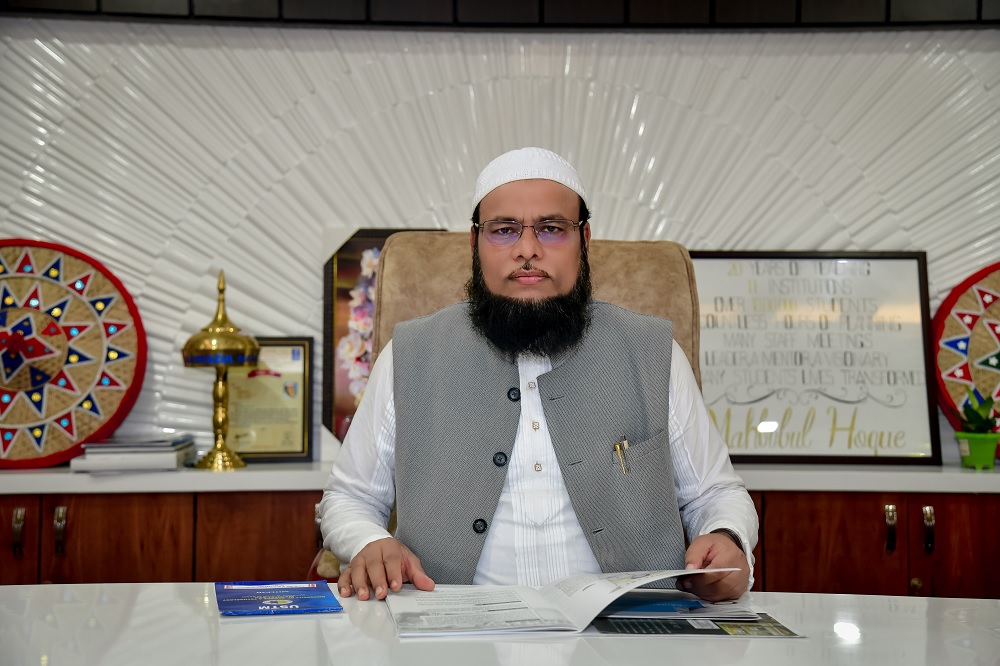



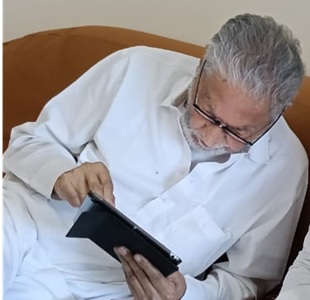
0 Comments